Guinea pigs love fruits and vegetables. Selecting the right kinds of vegetables to feed them can be quite difficult. But don’t worry, we are here to help you with this. The topic of discussion is cabbage and if guinea pigs can implement it into their diet plan.
Can guinea pigs eat cabbage? Guinea pigs can eat cabbage. Cabbage is a very nutritious vegetable that contains phytochemicals. It also has other necessary vitamins and minerals that will keep your guinea pig healthy. Cabbage is like cauliflower, they are extremely rich in vitamin C (44%) and vitamin K (72%).
How cabbage can be beneficial to your guinea pigs? What nutritional value does it add? What risks are likely to occur when you feed them? Don’t worry, this post will answer all these questions. Now let’s talk about the benefits of feeding cabbage to your guinea pig.
Table of Content
Are Cabages Safe for Guinea Pigs? | Health Benefits
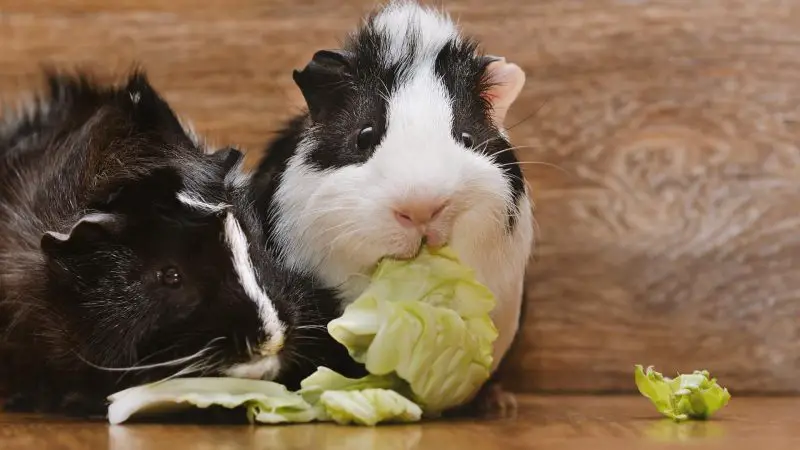
Low in Fat
Just like cauliflower, cabbage is extremely low in fat and contains a high amount of vitamins and minerals. You must know how important vitamin C is in the body of a guinea pig.
Guinea pigs can’t produce this vitamin themselves. Yet, they especially need it when they are young to grow and to function properly. Cabbage is also rich in antioxidants which can be beneficial to guinea pigs during pregnancy.
Anti-Aging Effects
The combination of vitamins C, A, and D can help your guinea pig have a longer life span. These vitamins have anti-aging effects and keep their cells from damage.
In addition to this, they also have the power to heal. If provided in a reasonable quantity, it can effectively heal things like rashes, insect bites, and wounds. The sulfur, calcium, magnesium, and iron can also help stimulate the growth of soft and healthy hair. In short words, they prevent hair loss.
Boosts immune system
Cabbage also contains a high volume of vitamin C that boosts the immune system of your cavy. Cabbage has an excellent level of amino acids, that prevents inflammation.
The beta-carotene contents help to keep their eye sharp all the time. The intake of cabbage can reduce the risk of Alzheimer’s disease in guinea pigs, due to the presence of glutamine and vitamin K in it.
Help in Digestion
Cabbage can also help your guinea pig to aid digestion and provide relief from constipation. If properly administered to them, it provides the necessary relief from sore muscles.
With the presence of calcium and vitamin K in cabbage, it can keep their bones and teeth strong. Guinea pig’s teeth always grow and the cabbage can be useful in maintaining the sizes of their teeth.
Nutrition Facts of Cabbages for Guinea Pigs
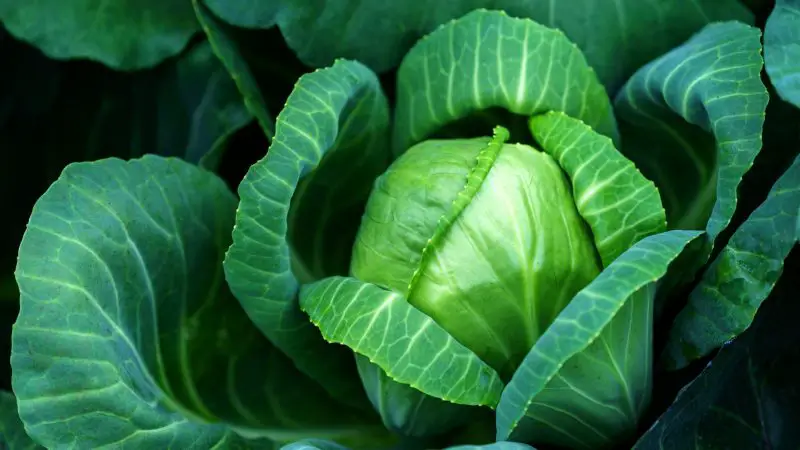
Cabbage is very rich in carbohydrates, this will make your guinea pig more agile and mentally active. The calcium and vitamin K contents also help your piggy to build strong bones and teeth. It is extremely low in cholesterol and saturated fat.
Cabbage is also a good source of sinigrin, which has gained special attention in the research against cancer. It has a special antioxidant called cyanidins. This helps guinea pigs by providing for them a kind of “premium” protection against cardiovascular diseases.
Moreover, it contains 20 flavonoids and 15 phenols (namely; caffeic acid, benzoic acid, hydroxycinnamic acid, coumaric acid, dimethylbenzoic acid, cinnamic acid, vanillic acid, gallic acid, hydroxybenzoic acid, phenylacetic acid, rosmarinic acid, syringic acid, and trimethylbenzoic acid). They all function as antioxidants, which aids in fighting against several diseases.
This is the nutritional value of raw cabbage per 100g:
- Energy – 103 kJ (25 kcal)
- Carbohydrates – (5.8 g)
- Sugars – (3.2 g)
- Dietary fiber – (2.5 g)
- Fat – (0.1 g)
- Protein – (1.28 g)
Vitamins:
- Thiamine (B1) – 5% (0.061 mg)
- Riboflavin (B2) – 3% (0.040 mg)
- Niacin (B3) – 2% (0.234 mg)
- Pantothenic acid (B5) – 4% (0.212 mg)
- Vitamin B6 – 10% (0.124 mg)
- Folate (B9) – 11% (43 μg)
- Vitamin C – 44% (36.6 mg)
- Vitamin K – 72% (76 μg)
Minerals:
- Calcium – 4% (40 mg)
- Iron – 4% (0.47 mg)
- Magnesium – 3% (12 mg)
- Manganese – 8% (0.16 mg)
- Phosphorus – 4% (26 mg)
- Potassium – 4% (170 mg)
- Sodium – 1% (18 mg)
- Zinc – 2% (0.18 mg)
Are Cabbages Bad for Guinea Pigs? | Possible Risks
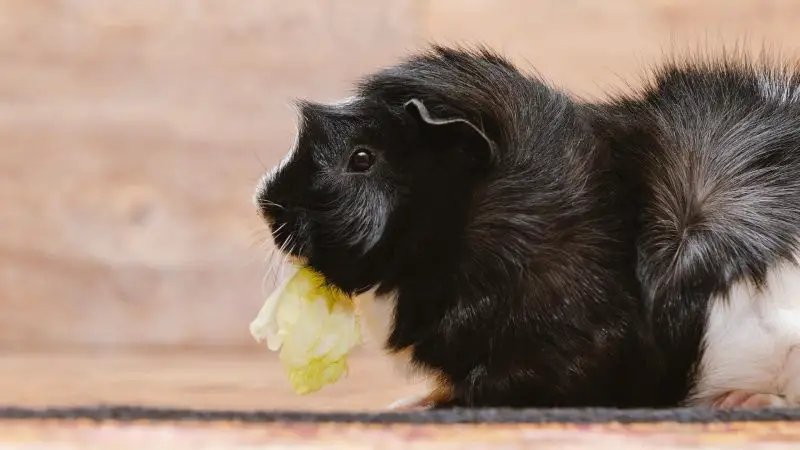
Knowing what to feed your guinea pig is important and that’s why you must know the benefits and risks of feeding cabbage to your cute pet. Some foods can have dangerous side effects when consumed in excess.
It is true that cabbage contains a very high amount of nutrients. However, too much cabbage can also have side effects on your guinea pig. Some of the risks that a guinea pig may experience are the following:
- A heavy intake of cabbage can cause flatulence. This may be because of too much raffinose in the intestine. Too much of cabbage when fed constantly to your cavy can block the intestine and lead to diarrhea.
- Cabbage has a high level of vitamin K that helps the blood to clot. When fed with a heavy ratio, your guinea pig’s blood can begin to congeal. This can eventually cause heavy problems. So serve them an appropriate ration.
- Also, the sulfur content in the cabbage can cause them digestive problems. Guinea pigs cannot pass gas, so feeding them too much of cabbage can lead to bloating. It is best that you feed them cabbage twice weekly. With this, there are no risks of the side effects and they will still be able to gain enough nutrients from the cabbage.
Serving Size, Preparation and Frequency Of Cabbage
Fresh vegetables can be offered to guinea pigs almost every day but when it comes to cabbage, we recommend giving your guinea pigs a maximum of 3 times a week.
Serving size can be one or two leaves (when coped equally to one cup). As for the preparation, there is no need to chop it into smaller pieces because your guinea pig will still devour it in a few minutes.
More Information About Cabbages and Guinea Pigs
Can Guinea Pigs Eat Cabbage Leaves?
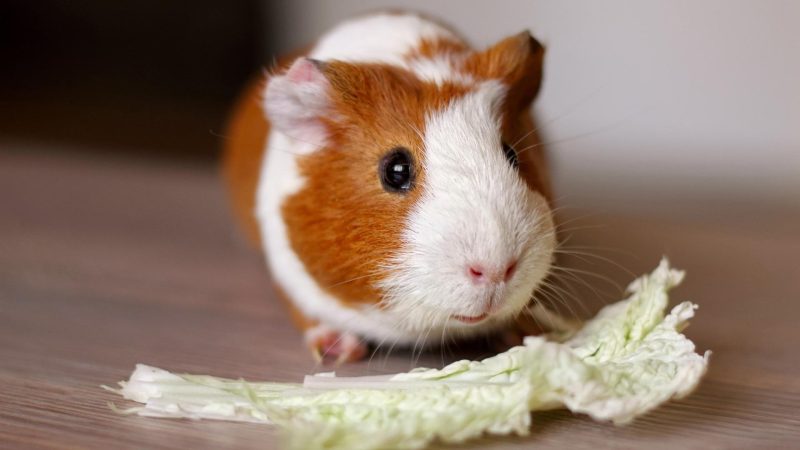
Cabbage leaves are suitable for guinea pigs. They are abundant in phytochemicals as well as Vitamins A, C, and K, and are quite nutritious. However, because cabbage leaves contain calcium, which promotes bladder sludge, adhere to the feeding instructions. Overfeeding cabbage leaves to guinea pigs can cause bloat and indigestion.
Is Green Cabbage Good for Guinea Pigs?
Green cabbage is harmful to the guinea pig’s health. You can, however, offer it to your pet in small to moderate amounts. Vitamin C is abundant in green cabbage, which is beneficial to your pet’s health. Meanwhile, it contains a significant amount of calcium. Guinea pigs can get bladder and kidney stones if they consume too much calcium.
Is Red Cabbage Good for Guinea Pigs?
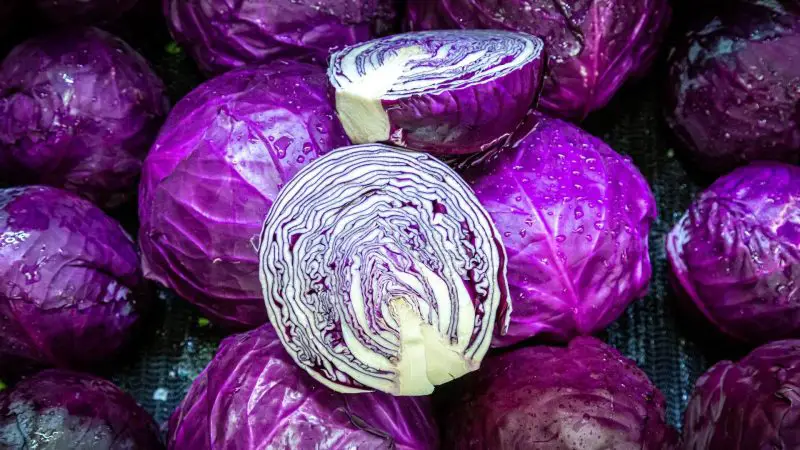
Red cabbage is undoubtedly the best option to give your pet since it contains more Vitamin C than most other kinds of cabbage. Scurvy is a potentially lethal condition that affects guinea pigs who don’t get enough Vitamin C. The significant amounts of Vitamin C in the food will help avoid your pet from getting sick.
However, red cabbage also includes a significant amount of calcium. This means you shouldn’t give it to your pet too regularly because it might cause urinary tract stones.
Is Chinese Cabbage Good for Guinea Pigs?
When it comes to guinea pigs, Chinese cabbage is perhaps the least suitable. Chinese cabbage includes a large amount of Vitamin C, which will guarantee that your pet receives adequate amounts of this vital vitamin. It is, nevertheless, a calcium-rich food. It has more than three times the calcium content of other cabbage varieties. As a result, if you decide to give it to your pet, you should do it with caution.
Is Savoy Cabbage Good for Guinea Pigs?
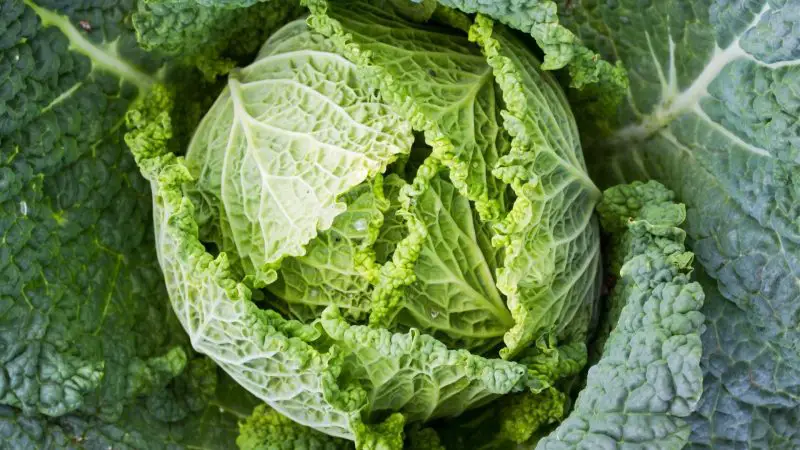
Savoy cabbage is not recommended for pet consumption. It lacks the Vitamin C content of the other cabbage varieties here, thus it won’t protect your pet against scurvy.
Because savoy cabbage contains less calcium, it may be beneficial to guinea pigs who have previously experienced urinary tract stones. Just bear in mind that to keep your pet healthy, you’ll probably need to feed him some Vitamin C-rich veggies.
Quick Facts on Cabbages
The following facts about cabbages will amaze you:
- Cabbage is also referred to as headed-cabbage. It is categorized under the same family as cauliflower and broccoli. Cabbage is a biannually grown vegetable. It is believed to have originated from Europe in the 14th century.
- Cabbage is usually described as one of the oldest vegetables.
- Cabbage is extremely high in Vitamins C and K, and fiber. It is also extremely low in fat and cholesterol.
- There are different types of cabbage, but only four types are very common. First, the purple cabbage. It contains more vitamin C than the others. Second, the savoy cabbage, which also contains more iron, calcium, potassium, and Vitamin A. Lastly, the green cabbage. This is the commonest one. It contains the same nutrients but in lesser and reasonable quantities.
- According to the United Nations, China tops the list of the highest producers of cabbage, with an annual production rate of 33.4 millions of tonnes, followed by India, European Union, Russia, South Korea, and Japan.
- Cabbage can be eaten raw, boiled, steamed, braised, fermented and microwaved.
- Research shows that cabbage contains nutrients (for example, sulforaphane) that can help fight and prevent cancer in the body.
- It is also used in the production of drugs. Cabbage forms the main ingredient that is used as an antidote for mushroom poisoning. It is also used for eye salves, and liniments used in treating arthritis and bruise healing.
- In ancient China, cabbage was believed to be magic that can be used to cure complete hair loss in men.
- Cabbage is best grown in climates that are mild and cool.
With food, you should be careful what to choose. If you are not sure what to feed them but believe your little piggies deserve some great treats, check our Helpful Guide to the Best Guinea Pig Treats to get some ideas.
We have also made a full list of foods that guinea pigs can and can’t eat (150+ Types of Foods). Be sure to also check our recommended products page for everything you will ever need to assure a happy life for your guinea pigs. Hope this information was helpful and you have found the answer you were looking for.
List of Sources
Aging, Cortical Injury and Alzheimer’s Disease-Like Pathology in the Guinea Pig Brain
Diet Composition and Mineral Balance in Guinea Pigs
The Effects of Diet on Anatomy, Physiology and Health in the Guinea Pig
Some Determinants of Intake and Patterns of Feeding in the Guinea Pig
